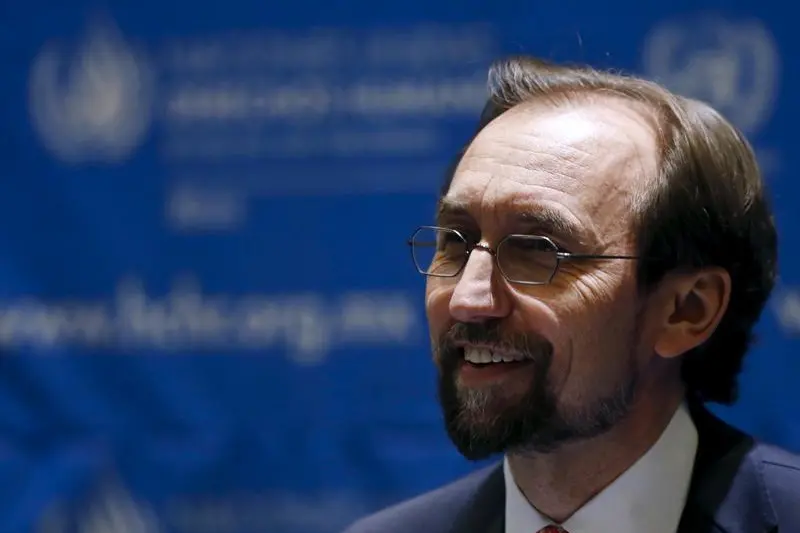PHOTO
(Adds quotes, details)
GENEVA, Sept 13 (Reuters) - U.N. Human Rights Commissioner Zeid Ra'ad al Hussein condemned the Syrian government on Tuesday, in a wide-ranging speech cataloguing human rights abuses around the world.
In a speech opening a three-week session of the U.N. Human Rights Council, Zeid said Syria was one of five countries that routinely refused to cooperate with human rights investigators.
"This is a state led by a medical doctor and yet is believed to have gassed its own people; has attacked hospitals and bombed civilian neighbourhoods with indiscriminate explosive weapons; and maintains tens of thousands of detainees in inhuman conditions," Zeid said.
"Words cannot convey how profoundly I condemn this situation."
The other countries are Belarus, Eritrea, North Korea, and Iran, but Israel also had a long record of refusing cooperation in terms of access to occupied Palestinian territory, he added.
Venezuela had comprehensively denied access to Zeid's staff, refusing his regional representative a visa for the past two and a half years, he said.
"States may shut my office out - but they will not shut us up; neither will they blind us. If access is refused us, we will assume the worst, and yet do our utmost to nonetheless report as accurately as we can on serious allegations." The council, based in Geneva, is made up of 47 countries and aims to protect human rights around the world. It can mandate investigations into suspected abuses.
He cited southeastern Turkey and the Ethiopian regions of Omoria and Amhara, Uzbekistan and both sides of the line of control between India and Pakistan as places that needed immediate investigation, as well as the Nagorno-Karabakh, Abkhazia and South Ossetia in the Caucasus.
The situation in Yemen should be subjected to a "comprehensive inquiry by an international independent body", and Bahrain should also pay more attention to human rights, he said.
"The past decade has demonstrated repeatedly and with punishing clarity exactly how disastrous the outcomes can be when a government attempts to smash the voices of its people, instead of serving them," Zeid said in reference to Bahrain.
Zeid, who recently attacked populists politicians such as U.S. presidential candidate Donald Trump in a speech in the Hague, took another swipe at the dangers of populism in his speech to the council.
"A number of elections will be held in well established democracies, with dangerous xenophobes and bigots running for office, and what falls to us then could begin to determine, as never before, the future course of 'we the peoples' of this earth," he said.
(Reporting by Tom Miles; Editing by Dominic Evans and Raissa Kasolowsky) ((tom.miles@thomsonreuters.com; +41 22 733 38 31; Reuters Messaging: tom.miles.reuters.com@reuters.net))
GENEVA, Sept 13 (Reuters) - U.N. Human Rights Commissioner Zeid Ra'ad al Hussein condemned the Syrian government on Tuesday, in a wide-ranging speech cataloguing human rights abuses around the world.
In a speech opening a three-week session of the U.N. Human Rights Council, Zeid said Syria was one of five countries that routinely refused to cooperate with human rights investigators.
"This is a state led by a medical doctor and yet is believed to have gassed its own people; has attacked hospitals and bombed civilian neighbourhoods with indiscriminate explosive weapons; and maintains tens of thousands of detainees in inhuman conditions," Zeid said.
"Words cannot convey how profoundly I condemn this situation."
The other countries are Belarus, Eritrea, North Korea, and Iran, but Israel also had a long record of refusing cooperation in terms of access to occupied Palestinian territory, he added.
Venezuela had comprehensively denied access to Zeid's staff, refusing his regional representative a visa for the past two and a half years, he said.
"States may shut my office out - but they will not shut us up; neither will they blind us. If access is refused us, we will assume the worst, and yet do our utmost to nonetheless report as accurately as we can on serious allegations." The council, based in Geneva, is made up of 47 countries and aims to protect human rights around the world. It can mandate investigations into suspected abuses.
He cited southeastern Turkey and the Ethiopian regions of Omoria and Amhara, Uzbekistan and both sides of the line of control between India and Pakistan as places that needed immediate investigation, as well as the Nagorno-Karabakh, Abkhazia and South Ossetia in the Caucasus.
The situation in Yemen should be subjected to a "comprehensive inquiry by an international independent body", and Bahrain should also pay more attention to human rights, he said.
"The past decade has demonstrated repeatedly and with punishing clarity exactly how disastrous the outcomes can be when a government attempts to smash the voices of its people, instead of serving them," Zeid said in reference to Bahrain.
Zeid, who recently attacked populists politicians such as U.S. presidential candidate Donald Trump in a speech in the Hague, took another swipe at the dangers of populism in his speech to the council.
"A number of elections will be held in well established democracies, with dangerous xenophobes and bigots running for office, and what falls to us then could begin to determine, as never before, the future course of 'we the peoples' of this earth," he said.
(Reporting by Tom Miles; Editing by Dominic Evans and Raissa Kasolowsky) ((tom.miles@thomsonreuters.com; +41 22 733 38 31; Reuters Messaging: tom.miles.reuters.com@reuters.net))





















